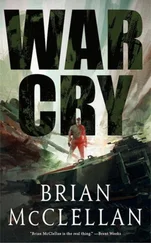Besides, after all this time she still knew that pleased whistle.
“Why are you here, Taniel?” she demanded.
Taniel Two-shot, wearing another man’s face, lifted his hand to hail a hackney cab. “Because we need to have a talk.”

“This isn’t a street address,” the clerk said.
Michel stood at the front of a long line in the Landfall commissioner’s office while a middle-aged clerk looked at him over the top of her spectacles. She held his paper in her hand, arm outstretched to one side as if the whole thing was a terrible inconvenience. Michel, wearing plainclothes instead of a uniform, resisted the urge to pull out his Gold Rose and reminded himself he was trying to be as circumspect as possible.
“You’re joking,” Michel said.
“Nope.” She handed the paper back. “It’s not an address.”
He took it sourly, stuffing it in his pocket. “That explains why I couldn’t find the damn place anywhere.”
“Mm-hmm.” The clerk made a show of looking around him at the line. “Next!” she shouted, waving him away dismissively. “It’s not an address. It’s a lot number. Probably south of the city.”
“What do you mean, a lot number?” The next person in line approached the desk and started talking, but Michel shoved himself back in front of the clerk. “Lot number?” he demanded.
“Public land. South of the city.”
“That’s the same as an address!”
“Good day, sir. Next, please.”
Michel wasn’t certain what to expect when he took a hackney cab two miles south of the outskirts of Landfall. There wasn’t much out here but farmland – endless floodplains covered in tobacco, cotton, and wheat. What he didn’t expect was to find a camp.
From a distance it resembled a labor camp. Acres upon acres had been cordoned off, a short palisade built to encircle countless rows of dirty tents. There were a few wooden buildings in the center, beside a number of man-made hills of soil, steaming in the summer heat like piles of shit. The camp had been plopped right in the center of a cotton field, plants crushed underfoot, muddy wagon ruts leading to and from the main road.
As he drew closer he caught sight of guards in yellow uniforms doing a frequent circuit of the camp, carrying Hrusch rifles instead of truncheons – a sure sign of a military presence. He vaguely remembered reading something in the newspaper about an archeology dig down here, but he hadn’t read the whole article. The local colleges had half of Landfall dug up looking for Dynize relics, so one dig hadn’t stood out to him.
The cab came to a stop near one of the muddy paths leading to the camp. Michel vacillated. Heading into camp didn’t seem advisable, not with so many guards. But this was his best lead on the godstones. If he let it go, then… then what? The camp looked semipermanent. It would still be here in a week or two, and once the Blackhats were no longer on high alert Michel might get a chance to snoop around the upper archives with carte blanche. Hurrying now might betray his real purpose to Fidelis Jes.
He thumped on the roof of the cab. “Head back to the city,” he called.
“Uh, sorry, sir,” the driver responded. “A man wants to speak to you.”
“A man…?” Michel trailed off as a soldier rounded the side of the cab and came up to the window, opening the door with one hand while the other rested on the butt of his pistol. He wore a dark yellow uniform with the bar and star of a major in the Fatrastan army on one shoulder, and a stitched white rose on the other; a soldier working with Blackhat authority.
The major did not look pleased. His broad face was expressionless, his mouth pressed into a firm line and his back as stiff as a board. “Out of the cab,” he said.
“I think there’s been a misunderstanding,” Michel responded.
The major reached inside and grabbed Michel by the front of his shirt, dragging him out of the cab as he protested. Michel managed to keep his feet, avoiding the indignity of falling in the mud, and soon found himself surrounded by a whole platoon of the Landfall garrison. He swallowed, closed his eyes, and let instinct kick in.
“You curious about what’s going on here?” the major demanded, pointing at the camp behind him. “Didn’t you see the signs? No stopping? The newspapers were told to stay out.”
Michel cleared his throat, letting an irritated expression blanket his face, and snapped, “Are you paranoid, Major?”
The major leaned forward slightly, the corner of his mouth lifting in a sneer. “Am I what?”
Slowly, deliberately, Michel drew the Gold Rose from his shirt and let it dangle at the end of its chain. Somewhere in the back of the company someone muttered just a little too loudly, “The major messed up this time.” He was quickly shushed.
“Surprise inspection, Major,” Michel said, trying to sound as smug as possible.
The major somehow managed to straighten further, eyes snapping forward and hand coming up in a salute. “Sir!”
Michel didn’t give the major any time to ask questions. He was in it now, and he needed to move quickly enough that he was gone before anyone could figure out that maybe he wasn’t supposed to be here. He ran through a hundred questions in his head, trying to figure out how to ask what the pit this place was without looking like he didn’t actually know. “State your name.”
“Major Cole, sir.”
“Major Cole, would you kindly have your men escort me to the camp?”
“Of course, sir. Fall in!”
Within moments Michel was squelching through the mud, wondering if his shoes would be completely ruined and resisting the urge to look back at his cab. This little excursion had either just gone very right, or very, very wrong.
They entered the camp through a guarded gap in the palisade. Convict laborers milled everywhere. Some stood by the palisade, taking their lunch of gruel and bread, while others hid from the heat beneath sagging tents. They stared at Michel with sunken, bleary eyes, and he wondered at the size of the workforce and the presence of the army for what appeared – from a distance, at least – to be a midsize archeology dig.
The major snapped another salute when they reached one of the buildings in the center of the camp. “Very sorry for the confusion, sir. I hope you’ll understand I was just doing my job.”
“Which is?” Michel asked, trying to look like he didn’t actually care.
“Make sure no one takes too much interest in the camp, sir.”
Michel bit his tongue to keep from asking why and gave a gracious nod. “Thank you, Major, I’ll take your… zeal… into account on my report.” He gave one last glance around, noting the direction from which the laborers were coming with their wheelbarrows and then stepping up to the door to the building in front of him. The major seemed to expect that Michel wanted to end up here, so there was nothing to do but duck inside.
He found himself in what appeared to be a hastily built office barely bigger than a frontier tent. It was startlingly cool inside; a block of ice packed in sawdust was positioned in the corner of the room, while a pair of convicts slowly fanned it to circulate the air. Most of the space was taken up by tables and chairs, covered in vast stacks of handwritten notes. Other than the convicts, there was only a single occupant: a man bent over a table in the center of the room, his attention so focused as he scribbled notes that he didn’t even look up when Michel cleared his throat.
Michel picked his way through the papers, trying to avoid stepping on anything important with his muddy shoes. The man seemed completely oblivious to Michel’s presence. He stopped scribbling for a moment to scratch his balding scalp and mutter to himself, then went back to work. Michel bent over the nearest table, examining the notes.
Читать дальше











